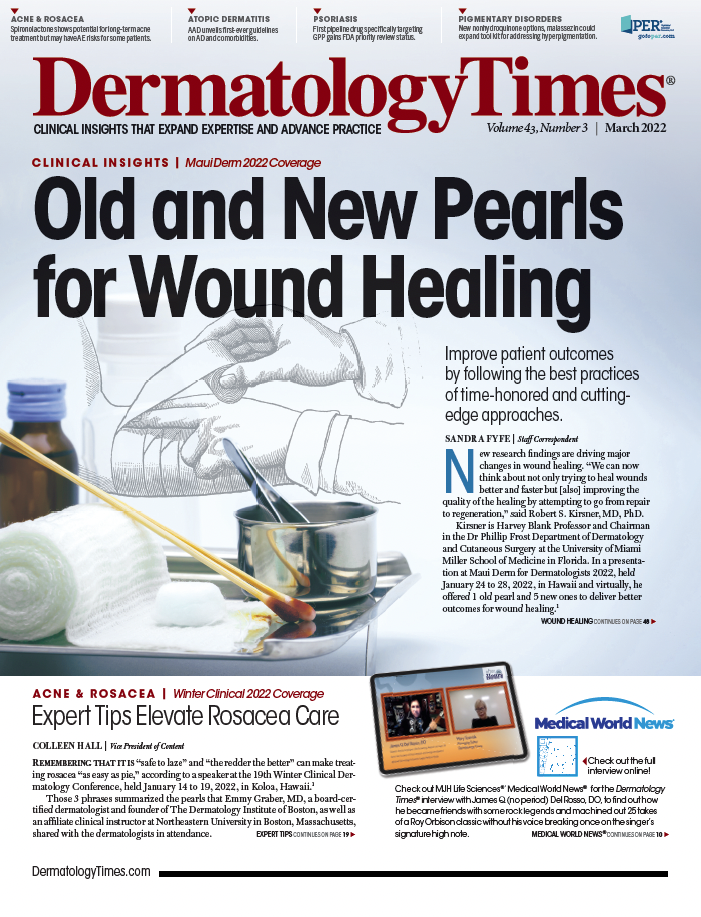- Case-Based Roundtable
- General Dermatology
- Eczema
- Chronic Hand Eczema
- Alopecia
- Aesthetics
- Vitiligo
- COVID-19
- Actinic Keratosis
- Precision Medicine and Biologics
- Rare Disease
- Wound Care
- Rosacea
- Psoriasis
- Psoriatic Arthritis
- Atopic Dermatitis
- Melasma
- NP and PA
- Skin Cancer
- Hidradenitis Suppurativa
- Drug Watch
- Pigmentary Disorders
- Acne
- Pediatric Dermatology
- Practice Management
- Prurigo Nodularis
- Buy-and-Bill
Publication
Article
Dermatology Times
Hormonal Acne Treatments: Balance the Rewards, Risks
Author(s):
Julie Harper, MD, of the Dermatology and Skin Care Center of Birmingham, Alabama explained the use, side effects, and risks of spironolactone and oral contraceptives in a presentation at the current Maui Derm for Dermatologists meeting in Maui, Hawaii.
Spironolactone and oral contraceptives work well for acne treatment, but providers should be familiar with their adverse effects (AEs) and risks, said Julie Harper, MD, in a presentation at Maui Derm for Dermatologists 2022 held January 24 to 28 in Maui, Hawaii.1
Julie Harper, who is a board-certified dermatologist in private practice at the Dermatology and Skin Care Center of Birmingham in Alabama provided a road map detailing recommendations on how to use these medications to achieve optimal outcomes and how to evaluate their AEs and risks. Spironolactone is an anti-androgen shown to be effective in treating acne, although it is not approved by the FDA for this purpose.1
Harper recommended a maximum dose of 100 mg once a day and suggested that it be used in conjunction with topical treatments such as retinoids, benzoyl peroxide, topical dapsone, and topical antibiotics. It also can be used with oral medications such doxycycline, minocycline, sarecycline (Seysara; Almirall), oral contraceptives, and isotretinoin.1
“Spironolactone’s use in combination with oral contraceptives reduces irregular menstrual periods and prevents pregnancy, which is important because its anti-androgen properties can increase the risk of feminization in male fetuses late in the first trimester,” Harper said.
Spironolactone’s possible AEs increase in higher doses, and include menstrual irregularities, breast tenderness and/or swelling, fatigue, headaches, diuresis, and orthostatic hypotension, she noted.1 It can be used long term, except when patients experience severe AEs, are pregnant, or acne subsides, Harper said.
As for risks, she highlighted a study by Plovanich et al that showed spironolactone carries a small risk of hyperkalemia, so healthy patients’ potassium may be monitored while taking the drug.2 Older patients, those with a history of cardiac or renal disease, or impaired liver function, and those on high doses should have potassium monitored, Harper said. Additionally, patients taking ACE inhibitors, angiotensin II antagonists, aldosterone blockers, non-steroidal anti-inflammatory drugs (NSAIDS) such as indomethacin, salt substitutes, potassium supplements, and rimethoprim/sulfamethoxazole require potassium monitoring.1
Harper noted that spironolactone has a black box warning and is tumorigenic in chronic toxicity studies in rats, so it should be used only in specific conditions under the Use and Indications information. She said there is no evidence of an increased risk of breast, uterine, or ovarian cancer with its use. It should not be used during pregnancy, but only appears in low levels in breast milk and is considered compatible for lactation, she added.1
Oral contraceptives can also be used to treat acne, including ethinyl estradiol 10-50 mg and 1st through 4th generation progestin.1 When using oral contraceptives to treat acne, providers should take a complete patient history to prevent serious AEs, Harper said. The FDA has approved Ortho-Tri-Cyclen (Janssen Pharmaceuticals), Estrostep FE, (Warner Chilcottt Inc), and Yaz (Bayer) for treatment, she reported.
Risks of taking oral contraceptives include venous thromboembolism, stroke, myocardial infarction, and breast cancer.1 Taking a thorough patient history is essential before prescribing oral contraceptives to treat acne, Harper said. She cautioned that patients who are pregnant, breast feeding less than 6 weeks postpartum, are older than 35 and heavy smokers (more than 15 cigarettes/day), have hypertension, have diabetes mellitus with nephropathy, retinopathy, neuropathy, or vascular disease, have a history of deep vein thrombosis, heart disease, or stroke should not receive this treatment.
In addition, patients with migraine headaches (with focal neurological symptoms at any age or without focal neurological symptoms but more than 35 years of age), and/or who have cirrhosis or liver tumor (benign or malignant) also should not be prescribed oral contraceptives for acne.1 Providers should note that some antibiotics interfere with contraceptive effectiveness and advise their patients of this.1 Patients should see improvement in acne after 3 cycles of pills, Harper said.
Reference:
1. Harper JC. Oral contraceptives and spironolactone for acne. Presented at: Maui Derm 2022; January 24 to 28, 2022; Wailea, Hawaii.
2. Plovanich M, Weng QY, Mostaghimi A. Low usefulness of potassium monitoring among healthy young women taking spironolactone for acne. JAMA Dermatol. 2015;151(9):941-944. doi:10.1001/jamadermatol.2015.34.







